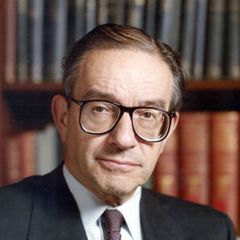
Alan Greenspan is an eminent economist best known as a former chairman of the U.S. Federal Reserve, a position he held for 18.5 years, from 1987 to 2006. The main merits attributed to him include the successful fight against inflation and crises. At the same time, Greenspan's critics insist on his direct involvement in the unfolding Of the American mortgage and the global economic crisis. He also became famous as the author of a number of bestsellers. One is economic work and, in part, Alan Greenspan's autobiography The Age of Shocks. Problems and prospects of the global financial system," which is recommended by students-economists, beginners and experienced traders.
Biography of Alan Greenspan
The future guru of bankers, investors and financiers was born in 1926, in the run-up to the Great Depression in the family of economist Herbert Grispen. Subsequently, the parents had little contact with their father. However, biographers are convinced that the last book "Recovery Ahead!" significantly influenced the formation of Alan Greenspan's views. Left with his mother Rosa Goldsmith, spent earlier childhood in the house of her parents, surrounded by numerous relatives. Already at a young age he showed a lot of talents: in particular, he had phenomenal mathematical abilities. The ability to instantly produce the most complex calculations in the mind demonstrated in public, acting as a super-computer. Communication with his pianist uncle involved in the writing of the musical Song of Love awakened alana's love of music. He was also interested in tennis and baseball during his school years.
Educated at the prestigious George Washington School, Greenspan got to know John Kenemi, a future consultant to Albert Einstein in mathematics and co-author of basic. After graduation, he earned money playing in the band Bill Sheiner and henry Jerome Orchestra. At this time he paid a lot of attention to the study of the economy. Since 1945 he studied at the Faculty of Economics of New York University, after which he received a master's degree. The attempt to continue education in graduate school was not successful: it simply did not have enough money. Alan Greenspan achieved his higher academic recognition and degree only after two and a half decades.
Alan Greenspan's career
In the early 1950s, he worked for the Conference Board research organization. At the same time comes acquaintance with the writer Ayn Rand, well-known contemporaries in the objective novel "Atlanta shrugged shoulders." Sharing many of her views, Greenspan supported unregulated capitalism and libertarianism. Further milestones of his professional development are teaching activities, and later – the founding of the consulting agency Townsend and Greenspan.
He met Richard Nixon and held a key role in his campaign and later served as an economic adviser. Greenspan's career in the White House survived the Watergate scandal and continued during Gerald Ford's presidency. With The coming to power, Jimmy Carter, who was running for the Democratic nomination, resigned, but returned to office with the election of a new Republican president, Ronald Reagan. In 1981-83. Alan Greenspan led the development and implementation of social security reform, and since 1987 he headed the Federal Reserve Service. In the same year, Townsend and Greenspan were liquidated. During his time at the Fed, he worked with the administrations of George H.W. Bush, Bill Clinton and George W. Bush, and served as the president's foreign intelligence adviser.
His successes in the corporate sector are also known, as well as participation in the development of Capital Cities, J.P. Morgan, Alcoa and other large companies. In 2002 he was awarded a knighthood for his global contribution to the development of the economy. Published in 2007, Alan Greenspan's book The Age of Shocks is partly an interpretation of the economic situation. In particular, the policy and profligacy of George W. Bush is criticized, as well as the hypothesis about the connection between the global crisis and the collapse of the USSR. In general, the author offers his own vision and expert opinion on the most important events of the late 20th and early 19th century. One of Alan Greenspan's most famous quotes: "Capitalism has no history of failure."
Alan Greenspan books:
- Alan Greenspan's Age of Shocks download